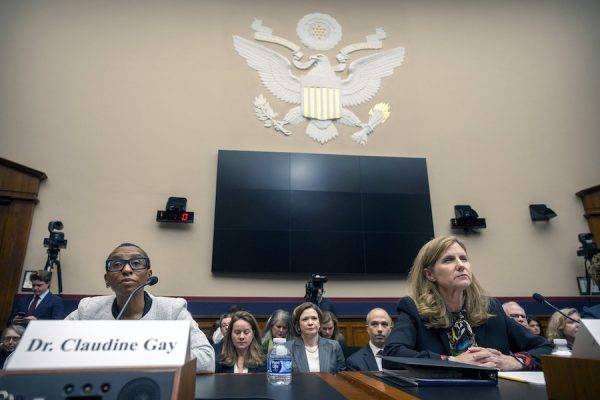Immigration attorney Nicole Ramos faces chaotic conditions as she advocates for migrants in Tijuana. Her organization, Al Otro Lado, which advises and represents migrants on both sides of the border, has been at the forefront of efforts to sue the Trump administration for gutting the due-process rights of asylum seekers. Al Otro Lado is housed a stone’s throw from the El Chaparral border crossing, and until recently, Ramos’s work was eased by her SENTRI pass, which allows expedited entry to the United States. Occasional disparaging comments from U.S. Customs and Border Protection (CBP) personnel suggested that Ramos’s advocacy had landed her on their radar, and then, on January 10, 2019, in the midst of the government shutdown, her pass was revoked without explanation.
Around the same time, Al Otro Lado’s other codirectors, Erika Pinheiro and Nora Philips, were also harassed while attempting to cross the border. On January 29, Pinheiro was detained for two hours at the Tijuana crossing and then refused entry into Mexico; during the ordeal, she was denied access to attorneys seeking to advocate on her behalf. Mexican authorities detained Phillips at the Guadalajara airport two days later, where she had flown with her husband and their seven-year-old daughter. Mexican officials informed Phillips that there was an alert on her passport and held her for more than nine hours, during which she was denied food and water. The ordeal concluded with her being put on a flight back to the United States.
Al Otro Lado’s suspicion that it has been the target of an intelligence campaign was confirmed when a Homeland Security database of activists and journalists was leaked.
Given the importance of legal representation in immigration proceedings, the intimidation of immigration attorneys is calamitous to our democratic norms. As the American Immigration Council Reports, “Immigrants with legal counsel were more likely to be released from detention, avoid being removed in absentia, and seek and obtain immigration relief,” among other benefits.
Al Otro Lado’s staff has been under siege in Mexico for more than a year. The harassment against staff has included death threats, smears, and harassment, including being photographed and followed in Tijuana. While advocating on behalf of a migrant with a disability, a CBP officer told Ramos “we know who you are and what you do.” Ramos was even the subject of a false Amber Alert while assisting an unaccompanied minor seeking asylum. The alert was later withdrawn, and a retraction printed in a local newspaper. Al Otro Lado has been targeted through its clients, as well. Migrants have told Ramos that CBP officials frequently demonize the organization’s work and have sought to sow fear and mistrust by telling them that Ramos is a “fake attorney” who dispenses false information and would, despite promising pro bono services, charge fees. Echoing Trump’s rhetoric, CBP have also accused asylum seekers of being coached by Ramos to lie about the persecution they face.
In February Al Otro Lado filed a petition before the Inter-American Commission on Human Rights requesting that the body urge the Mexican government to take necessary action to ensure the safety of Al Otro Lado’s staff and office. The petition alleges that Mexican authorities have failed to protect the organization from both non-state actors and the state itself, which has created a threatening environment that intensified in response to the organization’s lawsuits against the Trump administration—presumably at the urging of U.S. authorities. As Trump seized on migrant caravans to justify a national security emergency and bolster his demands for funding the wall, his administration apparently enlisted Mexican authorities to help suppress counternarratives and dissuade those advocating for migrant rights. In its litigation against the Trump administration, Al Otro Lado has highlighted the collaboration between U.S. and Mexican officials in violating the rights of asylum seekers.
Al Otro Lado’s suspicion that it has been the target of an intelligence campaign was partially confirmed in early March when NBC’s San Diego affiliate reported on a leaked Department of Homeland Security (DHS) database of activists and journalists that included Ramos. The vast majority of people on the list, which was called “San Diego Sector Foreign Operations Branch: Migrant Caravan FY-2019, Suspected Organizers, Coordinators, Instigators, and Media,” are U.S. citizens. Photos marked with a “X” indicated those who had already been questioned or subjected to adverse immigration action. In addition to photos, the database included dossiers with additional personal information on some, including a log of Ramos’s travels, her car’s make and model, her email address, and her mother’s name.
The intimidation of immigration attorneys is calamitous to our democratic norms.
In response to formal queries about the list, CBP assistant commissioner of public affairs Andrew Meehan explained that the agency had been seeking to question people about incidents of border unrest in Tijuana in November and January, when some migrants attempted to cross over. During the January incident, CBP claimed, some of the migrants were throwing stones, justifying CBP’s use of tear gas, though numerous witnesses contradict the story that migrants engaged in violence. Still, some of those recently harassed by CBP, including Pinheiro, were nowhere near the January incident. Faiza Patel, codirector of the Liberty and National Security Program at the Brennan Center for Justice, NYU School of Law, argues, “This justification rings hollow; it is much more plausible that the agency was tagging people based on their perceived involvement with the caravan, not as potential witnesses to any incident of violence.” The ability to question witnesses to crimes is available through standard investigative techniques, Patel notes, and would not require the dossiers compiled by authorities. The immigration consequences, including being denied entry to Mexico, also belie the stated justifications, as do reports that Dina Francesca Haynes, director of New England Law’s immigration law program, submitted to two UN Special Rapporteurs in February, detailing thirty-seven instances during which immigration advocates and activists have “been stopped during travel, allegedly in retaliation for their immigrant rights work.” As Haynes observes, “Some of it has occurred away from, and not in relation to work at the Southern Border, strongly suggesting there are more ‘lists’ than the one leaked.” Four attorneys and a journalist later reported being pulled aside in Arizona and Texas, far from the incidents CBP claimed to be investigating, with some saying they were questioned about their political views.
DHS’s watchdog, along with CBP’s Office of Professional Responsibility, has launched an investigation. At the same time, Senators Wydon and Grassley, a group of House members, and other lawmakers have demanded answers. In their letter to CBP commissioner Kevin McAleenan, House Homeland Security Committee members Bennie Thompson of Mississippi and Kathleen Rice of New York wrote, “The appearance that CBP is targeting journalists, lawyers, and advocates, and particularly those who work on immigration matters or report on border and immigration issues, raises questions about possible misuse of CBP’s border search authority and requires oversight to ensure the protection of Americans’ legal and constitutional rights.” But on March 14, CBP missed the committee’s deadline to answer questions.
This is not the first time that the Trump administration has taken aim at immigration attorneys. In October 2017, then attorney general Jeff Sessions disparaged “dirty immigration lawyers,” whom he accused of encouraging migrants to make false claims. A year later, Dan Kowalski, an immigration attorney and journalist who compiles a critical database of immigration news, was issued a summons by Immigration and Customs Enforcement (ICE) for circulating a leaked ICE internal memo about Sessions’s decision to restrict asylum claims based on domestic and gang violence. The Trump administration wanted to know Kowalski’s source for the leaked memo; Kowalski, in response, said he would resist a summons. “This blatant misuse of the law, abuse of a position of authority, warrantless subpoenas and use of administrative ‘summons’ to threaten private attorneys is authoritarian in nature and warns of worse erosion of rights to come,” wrote Haynes. She argued that through the cumulative impact of harassment efforts, “We are being threatened so that we will exercise prior restraint on ourselves.”
Activists have also been swept up in these intimation efforts—indeed, along with journalists, they were the principal targets of the leaked database. The group Pueblo Sin Fronteras (PSF) has accompanied caravans to provide humanitarian assistance and draw attention to violations of the national and international right to seek asylum. In recent months, a number of PSF activists have been sent to “secondary inspection” (which often include lengthy questioning and invasive searches of phones and cameras), and some have said authorities focused their questions on members of the group, ten of whom appear in the leaked database. PSF member and U.S. citizen Alex Mensing has been sent to secondary inspection on multiple occasions, while one of the group’s leaders in Tijuana, also a U.S. citizen, was handcuffed to a bench for five hours while CBP officers questioned him about the caravan. Several other PSF members recounted harassment they experienced while speaking with a delegation from the National Lawyers Guild, including being followed and beaten by Mexican authorities after launching a campaign against police abuse of migrants. Other humanitarian groups such as Border Angels, which runs a shelter in Tijuana and leaves water in the desert for migrants, also report increased harassment. It is worth noting that the targeting of activists is not only taking place near the border: a recent exposé in The Nation revealed that ICE had been surveilling protestors in New York City, as well.
The inclusion of journalists in the leaked database corresponds with a rise in their reports of harassment by CPB. During the same weeks when Al Otro Lado’s codirectors were harassed at the border, two journalists were also denied entry to Mexico. The Intercept has reported numerous other incidents of troubling treatment, raising fears of an orchestrated campaign to harass advocates and journalists for their work on the border, mainly in the form of intimidating secondary inspections at border crossings. Alex Ellerbeck, the North America program coordinator for the Committee to Protect Journalists (CPJ), told the Intercept that while “CPJ has documented dozens of cases of journalists asked about their work in secondary screening or asked to hand over their devices . . . the sheer number of cases back to back in a single point of entry and the incredibly blatant attempts to get journalists to act as informants for the government stand out as an escalation.” Targeting of journalists reporting at the border compromises government transparency, a cornerstone of our democracy, and threatens journalists’ capacity to have (and protect) confidential sources. Bing Guan, a photography student in New York, who was stopped by CBP, explained the impact to CPJ: “By weaponizing border checkpoints through the ongoing harassment of journalists, CBP is attempting to dissuade reporters from doing their job and reporting accurately on the current border situation.”
Rather than being more humane, Democrats’ push for electronic monitoring of the border may instead erode human rights and constitutional liberties.
One of the most worrisome aspects of the leaked database is the apparent cooperation between U.S. and Mexican authorities. As Ryan Devereaux reported in The Intercept, “the border dragnet was broad-based and binational.” It involved the U.S. border security apparatus, along with the FBI, and it collaborated with Mexican counterparts “under the controversial joint DHS-Pentagon border initiative known as Operation Secure Line (formerly known as Operation Faithful Patriot), which the Trump administration initiated in the run-up to the 2018 midterms.”
In the current national security environment, many data-sharing surveillance programs start locally and emanate nationally and internationally, with alarming implications for privacy protections. The revelations also compound worries that the Democrats’ push to substitute electronic monitoring of the border for a physical barrier will have unforeseen consequences. Rather than promote a more humane alternative, advocacy groups argue, high-tech solutions may instead erode human rights and constitutional liberties. As California governor Gavin Newsom noted: “the irony . . . shouldn’t be lost on anyone, that we have better data collection against journalists than we do children and parents. . . . We found out 471 parents have been removed from their children, and yet we have deep data collection on all of you. That’s America in 2019.”
For those working to illuminate the plight of migrants and to protect their rights, being singled out takes an undeniable toll. Since her codirectors were denied entry, Ramos has only left Mexico twice, but remains fiercely committed to her work: “Far from breaking the law, we are seeking to ensure that the U.S. government follows the law in its immigration practices—an effort the U.S. government appears to want to make harder by its surveillance and harassment of lawyers, media, and other imagined ‘instigators’.” The harassment of immigration activists, attorneys, and journalists warrants a congressional investigation and corrective action. Otherwise, democratic accountability and First Amendment freedoms may be yet further casualties of Trump’s war on migrants.






